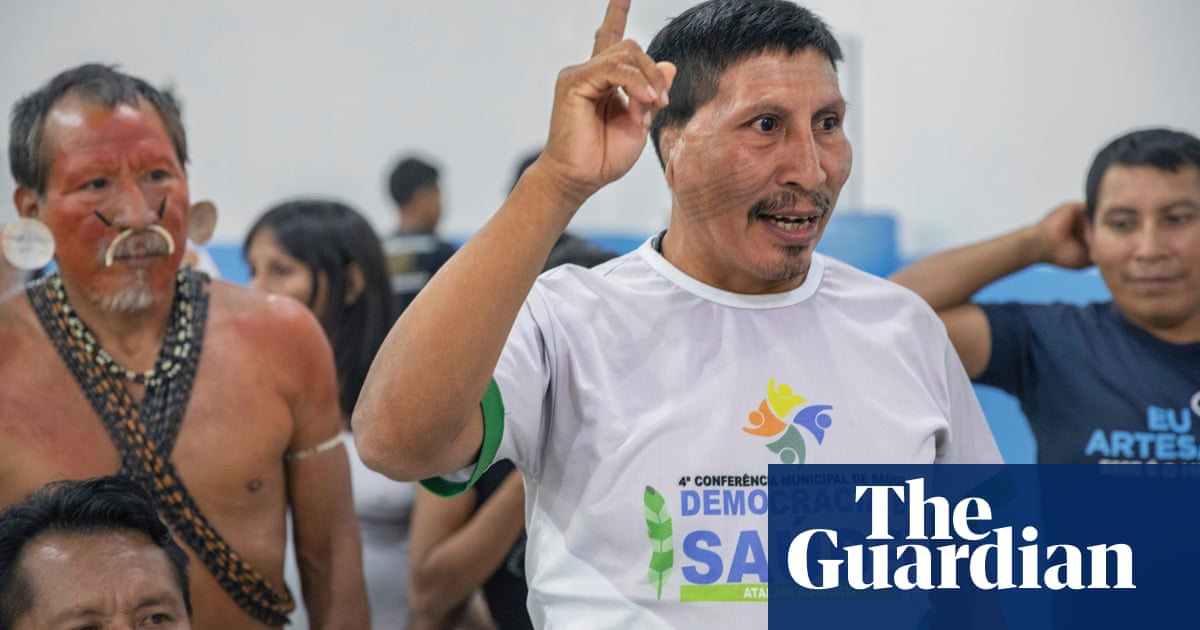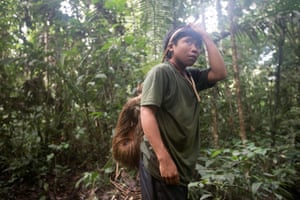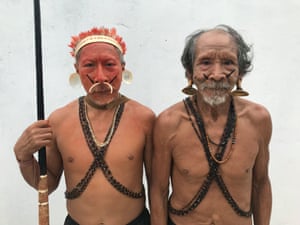Indigenous leaders who say Brazils new president is trying to force them from their lands are braced for a new era of ruin

As a blood-orange sunset drifted towards the forest canopy, Raimundo Kanamari sat on the riverbank and pondered the future of his tribe under Brazils far-right president.
Bolsonaros no good, he said. He wants to destroy the lot of us, bomb our villages. Thats the news I heard.
For all Jair Bolsonaros well-documented hostility to indigenous rights, an aerial assault on the Amazon seems far-fetched. But campaigners believe that under Brazils new administration indigenous communities face their most severe threat since military rulers bulldozed highways through the region nearly five decades ago, leaving behind a trail of death and environmental destruction.
Not since the dictatorship have we lived through such a tough moment, said Jaime Siqueira, the head of the Indigenous Work Centre (CTI), a Brazilian NGO supporting indigenous communities fighting to defend their lands.
Ewerton Marubo, a leader from the Javari Valley indigenous territory an almost Portugal-sized hinterland sheltering Brazils largest concentration of uncontacted tribes said its 6,000 inhabitants were bracing for a new era of ruin.
We are in a situation of great danger. [Bolsonaro] is proving himself to be the number one enemy of the indigenous, he said.
On a steamy July evening, Ewerton was one of two dozen regional leaders gathered in Atalaia do Norte the riverside portal to the Javari reserve to discuss ways to defend it from the anticipated onslaught.
Two days later caciques (chieftans) from the eight contacted tribes living in the region were due to hold an emergency summit at a village further west on the border with Peru.

Like other indigenous territories in the Amazon, the Javari Valley created in 1998 in an effort to protect its dwellers and their homes has long suffered incursions from intruders seeking to cash in on its abundant natural resources.
But as Bolsonaro ratchets up his anti-indigenous rhetoric and continues to dismantle Funai the already chronically underfunded agency supposed to protect Brazils 300-odd tribes Javari leaders fear a dramatic deterioration.
The current governments dream is to exterminate the indigenous people so they can take our land, claimed Kevin Mayoruna, 39, a leader from Javaris Matss tribe who recently staged a protest in his village on the Jaquirana River.
Marcos Mayoruna, another Matss leader, alleged that by deliberately failing to stop invaders entering the Javari reserve, and simultaneously depriving indigenous communities of healthcare and education, Bolsonaros administration was trying to force them from lands that could then be commercially developed.
All he thinks about is money. All he thinks about is deforestation, Mayoruna complained, warning of the implications for the global climate if Javaris forests were lost.
The forest isnt just for us indigenous, he said. Its for everyone.
The Javari Valley is far from the only indigenous territory threatened under Bolsonaro, who has compared their inhabitants to animals in zoos and vowed not to demarcate one square centimeter of land for such groups.
Thousands of wildcat miners apparently emboldened by Bolsonaros repeated proclamations that indigenous territories were too big have reportedly been pouring on to Yanomami lands near Brazils border with Venezuela in search of gold.
Further south in Rondnia state, members of the Uru-eu-wau-wau tribe have been battling since January to keep armed land-grabbers off their 1.9m hectare reserve.
But the stakes are particularly high in the Javari Valley, a balloon-shaped sweep of rainforests and rivers thought to house 16 lost tribes living in voluntary isolation. For such groups who can lack immunity to simple illnesses such as influenza contact with outsiders can be fatal.
Cristina Larran, an Atalaia-based activist for the Indigenous Missionary Council (Cimi), said Javaris tribes were facing an intensifying assault from loggers, cattle ranchers, hunters, fishermen and wildcat goldminers, as well as oil companies over the border in Peru.
Crippling budget cuts to Funai meant the agency had just 18 employees to stop intruders entering the 8.5m hectare enclave, and four other reserves further south.
The agency whose new Bolsonaroan chief has horrified specialists is so starved of resources that staff must buy anti-venom out of their own pockets before making perilous weeks-long missions into the Javaris snake-infested jungles.
It is an area the size of a country that is almost completely unprotected, Larran said. I feel overwhelmed.
Siqueira claimed Bolsonaros aggressive and condescending rhetoric towards Brazils indigenous peoples had already given their historic enemies the green light to accelerate their illegal advance into territories such as the Javari.
Its not just deforestation that has gone up in the Amazon [under Bolsonaro]. Violence against indigenous groups has, too, he said.
During a meeting with foreign journalists last week, Bolsonaro defended his desire to develop indigenous reserves, warned the international community against meddling in the Amazon, and painted himself as a champion of indigenous people who no longer wanted to live like prehistoric men with no access to technology, science, information, and the wonders of modernity.
But as they gathered at the headquarters of their indigenous association, Javari activists and elders said they were determined to resist what they called a Bolsonaro-backed assault on their ancestral homes.
He sees us as animals. As if we didnt know how to think, said Ewerton Marubo, who hoped foreign funding might help tribes adopt surveillance techniques to safeguard their land. But we are much more intelligent than he is.

Lucia Kanamari, one of the Javaris few female leaders, said: If the government doesnt support us, we must find a way of protecting ourselves. He [Bolsonaro] has come to leave us in the darkness, but we wont allow it.
Ewerton said he felt a particular duty to defend the isolados, the tribes living in seclusion deep in the reserve, who could not speak for themselves.
Just imagine if all this is destroyed, if the government opens this area up. In two years it will all be gone, he predicted. The wood will be gone. The fish will be gone. The rivers will all be polluted. All they want is to destroy.
As the sun rose over Atalaia do Norte and indigenous emissaries prepared to cast off for their rainforest conclave, the leaders convened for a final assembly about protecting their homes.
Ivan Chunu Matis, a Matis elder wearing a Macaw feather headdress and ear and nose rings fashioned from snail shells, grew agitated as he considered the threat posed by the man he calls Bolsonario.
Hes a bad man. Its as if he understands nothing, he remonstrated. He doesnt want to help the poor or the suffering. He just wants to help the rich so he can get the resources they desire.
As she readied herself for the trip, Lucia Kanamari said Javaris people were now fighting for their lives.
Hes not a president who has come to fix things. Hes a president who has come to destroy, she said. Its a tragedy for us.
The Guardian travelled to the Amazon with support from the Red Eclesial Panamaznica and Cidse, an international alliance of development agencies that includes the UKs Catholic Agency For Overseas Development (Cafod) and the Scottish Catholic International Aid Fund (Sciaf)
Read more: https://www.theguardian.com/world/2019/jul/26/bolsonaro-amazon-tribes-indigenous-brazil-dictatorship


Recent Comments